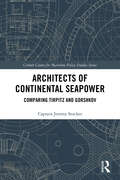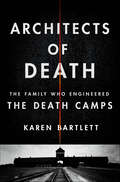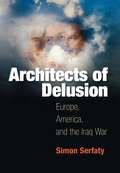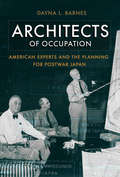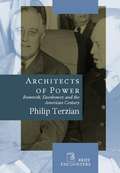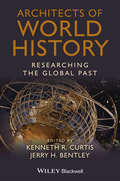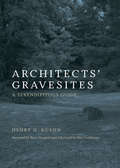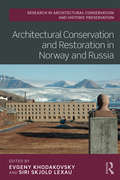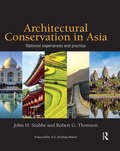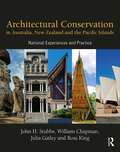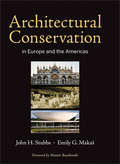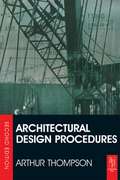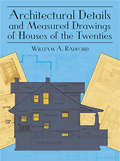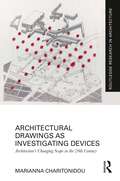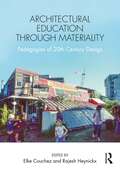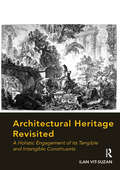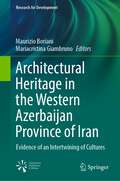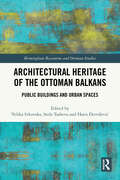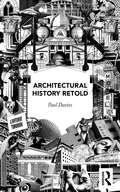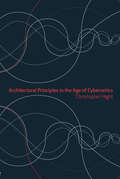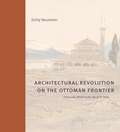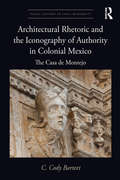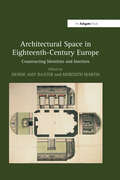- Table View
- List View
Architects of Continental Seapower: Comparing Tirpitz and Gorshkov (Corbett Centre for Maritime Policy Studies Series)
by Jeremy StockerThis book describes and analyses two iconic figures in twentieth-century naval history: the German Admiral Alfred von Tirpitz and the Russian Admiral Sergei Gorshkov. It examines the men, what they thought and wrote about seapower, the fleets they created and the strategic consequences of what they did. More broadly, it draws on the respective histories of the post-1897 Imperial German Navy and the post-1956 Soviet Navy to examine the continental bid for large-scale seapower. The work argues that both individuals built navies that did not, and could not, fulfil the objectives for which they were created. Drawing on the legacies of both men, the book also develops some wider ideas about the creation of large navies by continental states, with cautionary lessons for today’s emerging powers, India and China. Both admirals have received book-length biographies, but this is the first attempt at a comparative study and the first to draw broader strategic lessons from their respective attempts as continental navalists to challenge maritime states. This book will be of much interest to students of naval history, strategic studies and International Relations.
Architects of Death: The Family Who Engineered the Death Camps
by Karen BartlettA sobering story of an industrial family’s cold efficiency behind the design of the ovens at AuschwitzArchitects of Death tells the astonishing story of how the gas chambers and crematoria that facilitated the murder and incineration of more than one million people in the Holocaust were designed not by the Nazi SS, but by a small respectable family firm of German engineers. Topf and Sons designed and built the crematoria at the concentration camps at Auschwitz-Birkenau, Buchenwald, Belzec, Dachau, Mauthausen, and Gusen. At its height, 66 Topf triple muffle ovens were in operation—46 of which were at Auschwitz. These were not Nazi sadists, but men who were playboys and the sons of train conductors. They were driven not by ideology, but by love affairs, personal ambition, and bitter personal rivalries. Even while their firm created the ultimate human killing and disposal machines, their company sheltered Nazi enemies from the death camps. The intense conflagration of their very ordinary motives created work that surpassed in inhumanity even the demands of the SS. But the company that achieved this spectacularly evil feat of engineering typify the banality of evil. In the 1930s their family firm produced apparatus for all sorts of industries—baking, brewing, the firing of ceramics. Ovens for crematoria accounted for only a small proportion of their business, but it is for these that the Topf brothers became infamous. Their name can still be seen stamped on the iron furnaces of Auschwitz.
Architects of Delusion
by Simon SerfatyThe commencement of war in Iraq in 2003 was met with a variety of reactions around the globe. In Architects of Delusion, Simon Serfaty presents a historical analysis of how and why the decision to wage war was endorsed by some of America's main European allies, especially Britain, and opposed by others, especially France and Germany.Tony Blair, George W. Bush, Jacques Chirac, and Gerhard Schroeder were, Serfaty argues, the architects of one of the most serious crises in postwar transatlantic relations. These four heads of state were the victims not only of their personal delusions but also of those of the nations they led. They all played the hand that their countries had dealt them--the forceful hand of a righteous America, the principled acquiescence of a faithful Britain, the determined intransigence of a quarrelsome France, and the ambiguous "new way" of a recast Germany.Serfaty's deft interweaving of the political histories and cultures of the four countries and the personalities of their leaders transcends the Europe-bashing debate sparked by the Iraq invasion. He contends that not one of these four leaders was entirely right or entirely wrong in his approach to the others or to the issues, before and during the war. For the resulting wounds to heal, though, and for the continuity of transatlantic relations, he reminds us that the United States and France must end their estrangement, France and Britain must resolve their differences, Germany must carry its weight relative to both France and Britain, and the United States must exert the same visionary leadership for the twenty-first century that it showed during its rise to preeminence in the twentieth century.
Architects of Occupation: American Experts and Planning for Postwar Japan
by Dayna L. BarnesThe Allied occupation of Japan is remembered as the "good occupation." An American-led coalition successfully turned a militaristic enemy into a stable and democratic ally. Of course, the story was more complicated, but the occupation did forge one of the most enduring relationships in the postwar world. Recent events, from the occupations of Iraq and Afghanistan to protests over American bases in Japan to increasingly aggressive territorial disputes between Asian nations over islands in the Pacific, have brought attention back to the subject of the occupation of Japan.In Architects of Occupation, Dayna L. Barnes exposes the wartime origins of occupation policy and broader plans for postwar Japan. She considers the role of presidents, bureaucrats, think tanks, the media, and Congress in policymaking. Members of these elite groups came together in an informal policy network that shaped planning. Rather than relying solely on government reports and records to understand policymaking, Barnes also uses letters, memoirs, diaries, and manuscripts written by policymakers to trace the rise and spread of ideas across the policy network. The book contributes a new facet to the substantial literature on the occupation, serves as a case study in foreign policy analysis, and tells a surprising new story about World War II.
Architects of Power
by Philip TerzianThe United States is not a preternaturally inward-looking nation, and isolation is not the natural disposition of Americans. The real question is not whether Americans are prone to isolation or engagement, but how their engagement with the world has evolved, how events have made the United States a superpower, and how these developments have been guided by political leadership. Indeed, the great debates on foreign affairs in American history have not been about whether to have debates on foreign affairs; they have been between the competing visions of American influence in the world.In Architects of Power, Philip Terzian examines two public figures in the twentieth century who personify, in their lives, careers, and philosophies, the rise of the United States of America to global leadership: Franklin D. Roosevelt and Dwight D. Eisenhower. Terzian reveals how both men recognized and acted on the global threats of their time and questions whether America can rise to the same challenges today. Without this clear window into the stricken world that Roosevelt inhabited and Eisenhower understood, we are unlikely to recognize the perils and challenges of the world we have inherited.
Architects of World History: Researching the Global Past
by Jerry H. Bentley Kenneth R. CurtisArchitects of World History presents an innovative collection of original essays by leading scholars associated with World History, exploring through intellectual autobiography the ideas, challenges, and inspirations that are shaping the field Features original, accessible contributions from pioneering scholars in the field Offers insights into the process of developing a workable world history research topic and the experience of professional life as a world historian. Points to methodological challenges; the scholar’s current research agenda in relation to the development of world history; and future directions anticipated for key areas within world history
Architects' Gravesites: A Serendipitous Guide (The\mit Press Ser.)
by Henry H. KuehnAn illustrated guide to the monumental and non-monumental final resting places of famous architects from Aalto Alvar to Frank Lloyd Wright.All working architects leave behind a string of monuments to themselves in the form of buildings they have designed. But what about the final spaces that architects themselves will occupy? Are architects' gravesites more monumental—more architectural—than others? This unique book provides an illustrated guide to more than 200 gravesites of famous architects, almost all of them in the United States. Led by our intrepid author, Henry Kuehn, we find that most graves of architects are not monumental but rather modest, that many architects did not design their final resting places, and that a surprising number had their ashes scattered.Architects' Gravesites offers an alphabetical listing, from Alvar Aalto and Dankmar Adler (Louis Sullivan's partner) to Frank Lloyd Wright and Minoru Yamasaki (designer of the Word Trade Center's twin towers). Each entry includes a brief note on the architect's career and a color photograph of the site. For example, Ludwig Mies van der Rohe is buried in Chicago under a simple granite slab designed by his architect grandson; Louise Bethune, the first American woman to become a professional architect, is buried under a headstone inscribed only with her husband's name (a plaque honoring her achievements was installed later); Philip Johnson's ashes were spread in his rose garden, with no marker, across the street from his famous Glass House; and the grave of Pierre L'Enfant in Arlington National Cemetery offers a breathtaking view of Washington, D.C., the city he designed. Architects' Gravesites is an architectural guide like no other, revealing as much about mortality as about monumentality.
Architectural Agents: The Delusional, Abusive, Addictive Lives of Buildings
by Annabel Jane WhartonBuildings are not benign; rather, they commonly manipulate and abuse their human users. Architectural Agents makes the case that buildings act in the world independently of their makers, patrons, owners, or occupants. And often they act badly. Treating buildings as bodies, Annabel Jane Wharton writes biographies of symptomatic structures in order to diagnose their pathologies. The violence of some sites is rooted in historical trauma; the unhealthy spatial behaviors of other spaces stem from political and economic ruthlessness. The places examined range from the Cloisters Museum in New York City and the Palestine Archaeological Museum (renamed the Rockefeller Museum) in Jerusalem to the grand Hostal de los Reyes Católicos in Santiago de Compostela, Spain, and Las Vegas casino resorts. Recognizing that a study of pathological spaces would not be complete without an investigation of digital structures, Wharton integrates into her argument an original consideration of the powerful architectures of video games and immersive worlds. Her work mounts a persuasive critique of popular phenomenological treatments of architecture. Architectural Agents advances an alternative theorization of buildings&’ agency—one rooted in buildings&’ essential materiality and historical formation—as the basis for her significant intervention in current debates over the boundaries separating humans, animals, and machines.
Architectural Conservation and Restoration in Norway and Russia (Routledge Research in Architectural Conservation and Historic Preservation)
by Evgeny Khodakovsky Siri Skjold LexauNorway and Russia have been closely related through the ages, both geographically and historically, and have experienced similar problems relating to climate, building maintenance and national wooden architecture. As a result, the parallel study of architectural conservation and restoration theories and practices in both neighbouring Northern states makes for a stimulating collective monograph. Architectural Conservation and Restoration in Norway and Russia delves into the main challenges of historic and contemporary architectural preservation practices in the two countries. The book consists of three main parts: the discovery and preservation of historical architecture in the late nineteenth to early twentieth century; contemporary approaches to former restorations and the conservation and maintenance of historical architecture; and, finally, current questions concerning preservation of twentieth-century architectural heritage which, due to different building technologies and artistic qualities, demand revised methods and historical evaluation. This is a valuable resource for academics, researchers and students in different areas of architecture (medieval, nineteenth-century, wooden and contemporary architecture) as well as in the fields of art, architectural history, cultural heritage and Scandinavian and Russian studies.
Architectural Conservation in Asia: National Experiences and Practice
by John H. Stubbs Robert G. ThomsonAt a time when organized heritage protection in Asia is developing at a rapid pace, Architectural Conservation in Asia provides the first comprehensive overview of architectural conservation practice from Afghanistan to the Philippines. The country-by-country analysis adopted by the book draws out local insights, experiences, best practice and solutions for effective cultural heritage management that will inform study and practice both in Asia and beyond. Whereas architectural conservation in much of the Western world has been extensively documented, this book brings together coverage of many regions where architectural conservation has been understudied. Following on from the highly influential companion volumes on global architectural conservation and architectural conservation in Europe and the Americas, with this book the authors extend their pioneering global examination to the dynamic and evolving field of architectural conservation in Asia. Throughout the book, the authors and regional experts provide local case studies and profile topics that bring depth and insight to this ambitious study. As architectural conservation becomes increasingly global in practice, this book will be of considerable assistance to architectural conservation practitioners, site managers and students of architecture, planning, archaeology and heritage studies worldwide.
Architectural Conservation in Australia, New Zealand and the Pacific Islands: National Experiences and Practice
by Ross King Julia Gatley William Chapman John H. StubbsThe fourth in a series that documents architectural conservation in different parts of the world, Architectural Conservation in Australia, New Zealand and the Pacific Islands: National Experiences and Practice addresses cultural heritage protection in a region which comprises one third of the Earth’s surface. In response to local needs, Australia, New Zealand and the Pacific Islands have developed some of the most important and influential techniques, legislation, doctrine and theories in cultural heritage management in the world. The evolution of the heritage protection ethos and contemporary architectural conservation practices in Australia and Oceania are discussed on a national and regional basis using ample illustrations and examples. Accomplishments in architectural conservation are discussed in their national and international contexts, with an emphasis on original developments (solutions) and contributions made to the overall field. Enriched with essays contributed from fifty-nine specialists and thought leaders in the field, this book contains an extraordinary breadth and depth of research and synthesis on the why’s and how’s of cultural heritage conservation. Its holistic approach provides an essential resource and reference for students, academics, researchers, policy makers, practitioners and all who are interested in conserving the built environment.
Architectural Conservation in Europe and the Americas
by John H. Stubbs Maka 353 Emily G. Mounir Bouchenaki"From such well-known and long-vexed sites as the Athenian Acropolis to more contemporary locales like the Space Age Modernist capital city of Brasília, the conflicting and not always neatly resolvable forces that bear upon preservation are addressed as clearly and thoughtfully as the general reader could hope for. "--New York Review of Books ". . . an astonishing feat of research, compilation and synthesis. "--Context The book delivers the first major survey concerning the conservation of cultural heritage in both Europe and the Americas. Architectural Conservation in Europe and the Americas serves as a convenient resource for professionals, students, and anyone interested in the field. Following the acclaimed Time Honored, this book presents contemporary practice on a country-by-country and region-by-region basis, facilitating comparative analysis of similarities and differences. The book stresses solutions in architectural heritage protection and the contexts in which they were developed.
Architectural Design Procedures
by Arthur ThompsonThis book explains how architects obtain and administer work from the moment the contract is signed, to the handing over of the finished building to the client and is an indispensible guide to all architecture students.This second edition has been thoroughly updated and expanded. It now includes significant additions to the section on design constraints, a new section on quality assurance and management and information on new acts and regulations introduced since the publication of the first edition. Other sections on subjects such as the Building Regulations, use of computers and standard forms and letters have been brought up to date.
Architectural Details and Measured Drawings of Houses of the Twenties
by William A. RadfordProvides details for frame houses, houses of brick, brick veneer, stucco, etc., as well as plans for barns, silos, ice houses, and other farm structures. Also includes plans for such interior features as built-in buffets and sideboards, kitchen cabinets, wardrobes, window seats, breakfast nooks, fireplaces, and more. 154 black-and-white illustrations.
Architectural Drawings as Investigating Devices: Architecture’s Changing Scope in the 20th Century (Routledge Research in Architecture)
by Marianna CharitonidouArchitectural Drawings as Investigating Devices explores how the changing modes of representation in architecture and urbanism relate to the transformation of how the addressees of architecture and urbanism are conceived. The book diagnoses the dominant epistemological debates in architecture and urbanism during the 20th and 21st centuries. It traces their transformations, paying special attention to Le Corbusier and Ludwig Mies van der Rohe’s preference for perspective representation, to the diagrams of Team 10 architects, to the critiques of functionalism, and the upgrade of the artefactual value of architectural drawings in Aldo Rossi, John Hejduk, Peter Eisenman, and Oswald Mathias Ungers, and, finally, to the reinvention of architectural programme through the event in Bernard Tschumi and the Office for Metropolitan Architecture (OMA). Particular emphasis is placed on the spirit of truth and clarity in modernist architecture, the relationship between the individual and the community in post-war era architecture, the decodification of design process as syntactic analogy and the paradigm of autonomy in the 1970s and 1980s architecture, the concern about the dynamic character of urban conditions and the potentialities hidden in architectural programme in the post-autonomy era. This book is based on extensive archival research in Canada, the USA and Europe, and will be of interest to architects, artists, researchers and students in architecture, architectural history, theory, cultural theory, philosophy and aesthetics.
Architectural Education Through Materiality: Pedagogies of 20th Century Design
by Elke CouchezWhat kind of architectural knowledge was cultivated through drawings, models, design-build experimental houses and learning environments in the 20th century? And, did new teaching techniques and tools foster pedagogical, institutional and even cultural renewal? Architectural Education Through Materiality: Pedagogies of 20th Century Design brings together a collection of illustrated essays dedicated to exploring the complex processes that transformed architecture’s pedagogies in the 20th century. The last decade has seen a substantial increase in interest in the history of architectural education. This book widens the geographical scope beyond local school histories and sets out to discover the very distinct materialities and technologies of schooling as active agents in the making of architectural schools. Architectural Education Through Materiality argues that knowledge transmission cannot be reduced to ‘software’, the relatively easily detectable ideas in course notes and handbooks, but also has to be studied in close relation to the ‘hardware’ of, for instance, wall pictures, textiles, campus designs, slide projectors and even bodies. Presenting illustrated case studies of works by architects, educators and theorists including Dalibor Vesely, Dom Hans van der Laan, the Global Tools group Heinrich Wölfflin, Alfons Hoppenbrouwers, Joseph Rykwert, Pancho Guedes and Robert Cummings, and focusing on student-led educational initiatives in Europe, the UK, North America and Australia, the book will inspire students, educators and professionals with an interest in the many ways architectural knowledge is produced and taught.
Architectural Heritage Revisited: A Holistic Engagement of its Tangible and Intangible Constituents
by Ilan Vit-SuzanBy improving our understanding of how the tangible and intangible dimensions of heritage are correlated, we could develop a relationship with heritage that goes beyond the mere act of conservation. This book argues that we need to recognize the historic monument as a tangible aspect of a holistic expression of culture that is rooted in specific spatio-temporal conditions. However, since the latter are constantly changing, it is vital to identify an implicit contradiction with the goals of conservation. As the intangible dimensions are more dynamic, driven by the transmission, reception, and advancement of knowledge, the reliance of the prevailing treatment of heritage today, conservation, ossifies this relationship. By examining three major heritage monuments - the Pantheon, Teotihuacan's Sun Pyramid and Alhambra - the book shows how these sites are the product of multiple strategies and unforeseen agents, accumulated through history. It emphasizes how these historical trends need to be better understood in order to attain a more 'organic' relationship with heritage and offers some recommendations that should be analyzed in participative processes of deliberation: the Pantheon's continuity could be extended; the Pyramid's loss, accepted; and Alhambra's exclusion, reversed. In this way, the book invites people to engage heritage from a historical understanding that is open to critical reassessment, dialogue, and cooperation.
Architectural Heritage in the Western Azerbaijan Province of Iran: Evidence of an Intertwining of Cultures (Research for Development)
by Maurizio Boriani Mariacristina GiambrunoThis book represents a reflection on the policies of preservation that were established and interventions for restoration that occurred in Iran before and in the years after the Khomeinist Revolution, as well as being an analysis of the impact that Italian restoration culture has had in the country. Research concerning the state of conservation and the ongoing restoration of the Armenian churches in the Khoy and Salmas areas is included, along with precise documentation of the observation of the two cities, their architecture and the context of their landscape. The problems of architectural restoration in present-day Iran and the compatible use of buildings no longer intended for worship are addressed. The book is bolstered by first-hand documentation obtained through inspections and interviews with Iranian specialists during three missions carried out between 2016 and 2018 and a large anthology of period texts that have only recently been made available for the first time for study in electronic form, including travel reports written by Westerners describing Persia between the 15th and 19th centuries.
Architectural Heritage of the Ottoman Balkans: Public Buildings and Urban Spaces (Birmingham Byzantine and Ottoman Studies)
by Velika Ivkovska Stela Tasheva Haris DerviševićThe Ottoman Empire's rule in the Balkans began in the late 14th century and continued until the late 19th century, and its impact on the region's history, culture, and society was significant. The systematic study of Ottoman influence in the Balkans, however, has only gained pace from the early 20th century.Architectural Heritage of the Ottoman Balkans: Public Buildings and Urban Spaces explores aspects and instances of Ottoman public architecture in the Balkans, a region that encompassed diverse populations, climates, and landscapes, all of which contributed to a wide array of architectural variations in both public and private structures. Throughout the book, a common thread emerges: the rich tapestry of Ottoman architecture in the Balkans reflects a synthesis of influences, both local and global. Ottoman, regional, and European architectural traditions intertwine to create a distinctive architectural identity that characterizes the region.This book also underscores the challenges of studying historical architecture, including language barriers and the scarcity of well-preserved records, while highlighting the importance of understanding these structures in their historical and cultural contexts.
Architectural History Retold
by Paul DaviesHow much do you know about Greek architecture? Roman? Gothic? The Renaissance? Modernism? Perhaps more importantly, do you know how these are connected or how one style evolved to become another? Or what happened historically during each of these periods? Architectural History Retold is your roadmap for your journey through architectural history. Offering a fresh take on what the author calls the ‘Great Enlightenment project’, it traces the grand narrative of western architecture in one concise, accessible volume. Starting in Ancient Greece and leading up to the present day, Paul Davies' unconventional, engaging style brings the past back to life, helping you to think beyond separate components and styles to recognise ‘the bigger picture’. The author is an academic and journalist with three decades of experience in introducing students to architectural history. The book is based on his successful entry-level course which has used the same unstuffy approach to break down barriers to understanding and engagement and inspire generations of students.
Architectural Possibilities in the Work of Eisenman (Routledge Research in Architecture)
by Michael JasperThis book examines the central decades of Peter Eisenman’s work through a formal and thematic analysis of key architectural projects and writings, revealing underlying characteristics and arguing for their productive continuity and transformative role. The book explores Eisenman’s approach to architectural form generation and thinking. It does this through a thematic and formal analysis of projects and writings from the mid-1970s to the mid-1990s. Following an introductory chapter addressing the theme of potentialities, the book is organised in two parts. The first part focuses on key period writings of Eisenman, framing the close reading around a practice of resistance, the architect’s approach to history as analysis, and the transformative conceptualisation of time. In the second part, the book undertakes an analysis of select projects from the 1980s and 1990s. Three formal preoccupations and conceptual orientations – ground manipulations, figuration, and spatial events – organise this part of the book. Previously unpublished material from the Peter Eisenman fonds, Canadian Centre for Architecture, Montréal, provides primary source material. A concluding chapter addresses Eisenman’s teaching, its relation to his larger project, and possible legacies for educators, practitioners, scholars, and theorists.
Architectural Principles in the Age of Cybernetics
by Christopher HightA theoretical history of anthropomorphism and proportion in modern architecture, this volume brings into focus the discourse around proportion with current problems of post-humanism in architecture alongside the new possibilities made available through digital technologies. The book examines how the body and its ordering has served as a central site of architectural discourse in recent decades, especially in attempts to reformulate architecture’s relationship to humanism, modernism and technology. Challenging some concepts and categories of architectural history and situates current debates within a broader cultural and technological context, Hight makes complex ideas easily accessible. Extensively illustrated and written without academic jargon for an informed but non-specialized architectural audience, this book elucidates the often obscure debates of avant-garde architectural discourse and design, while demonstrating how these debates have affected everyday places and concepts of architecture. As a result, it will appeal to professional architects, academics and students, combining as it does an insightful introduction to the fundamental issues of architectural history and theory over the past fifty years with entirely new formulations of what that history is and means.
Architectural Revolution on the Ottoman Frontier: Greece and Albania in the Age of Ali Pasha (Buildings, Landscapes, and Societies)
by Emily NeumeierIn the early nineteenth century, the most consequential developments in Ottoman architecture were taking place not in Istanbul but in the farthest reaches of imperial territory. Emily Neumeier investigates this wider phenomenon through a consideration of the architecture of Ali Pasha of Ioannina, one of the most prolific patrons in the history of the Ottoman Empire, who undertook a building program so ambitious that it ultimately got him killed.Ali Pasha is still a household name in present-day Greece and Albania, where he served as Ottoman governor from 1788 to 1822. To consolidate his rule over an incredibly diverse population, the governor set out on a sweeping building program that included mosques, palaces, military fortifications, dervish lodges, and even Orthodox Christian monasteries. Drawing upon a wealth of primary sources, Neumeier reveals how Ali Pasha’s buildings shifted the sociopolitical order by testing the standards of patronage established by the imperial court and relocating administrative authority from center to province. To reconstruct the world that Ali Pasha built, Neumeier draws from both extensive fieldwork and abundant archival material, whose far-flung nature—from Istanbul to London—reflects the impressively wide scope of Ali Pasha’s influence.Rigorously researched and packed with fascinating stories, this book presents an innovative spatial history of the Ottoman frontier during the age of revolutions, a pivotal period in the late eighteenth and early nineteenth centuries when there was no obvious blueprint for power. It will be of interest to specialists in art and architectural history, the Ottoman Empire, and Mediterranean, Islamic, and Modern Greek studies.
Architectural Rhetoric and the Iconography of Authority in Colonial Mexico: The Casa de Montejo (Visual Culture in Early Modernity)
by C. Cody BarteetThis book investigates the Casa de Montejo and considers the role of the building’s Plateresque façade as a form of visual rhetoric that conveyed ideas about the individual and communal cultural identities in sixteenth-century Yucatán. C. Cody Barteet analyzes the façade within the complex colonial world in which it belongs, including in multicultural Yucatán and the transatlantic world. This contextualization allows for an examination of the architectural rhetoric of the façade, the design of which visualizes the contestations of autonomy and authority occurring among the colonial peoples.
Architectural Space in Eighteenth-Century Europe: Constructing Identities and Interiors
Architectural Space in Eighteenth-Century Europe: Constructing Identities and Interiors explores how a diverse, pan-European group of eighteenth-century patrons - among them bankers, bishops, bluestockings, and courtesans - used architectural space and décor to shape and express identity. Eighteenth-century European architects understood the client's instrumental role in giving form and meaning to architectural space. In a treatise published in 1745, the French architect Germain Boffrand determined that a visitor could "judge the character of the master for whom the house was built by the way in which it is planned, decorated and distributed." This interdisciplinary volume addresses two key interests of contemporary historians working in a range of disciplines: one, the broad question of identity formation, most notably as it relates to ideas of gender, class, and ethnicity; and two, the role played by different spatial environments in the production - not merely the reflection - of identity at defining historical and cultural moments. By combining contemporary critical analysis with a historically specific approach, the book's contributors situate ideas of space and the self within the visual and material remains of interiors in eighteenth-century Europe. In doing so, they offer compelling new insight not only into this historical period, but also into our own.
